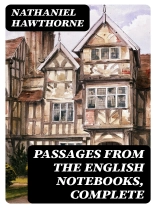In ‘Passages from the English Notebooks, Complete, ‘ Nathaniel Hawthorne offers a richly textured collection of reflections and observations from his travels in Europe, particularly in England. This work, characterized by its introspective prose and vivid imagery, navigates the intersections of personal experience and broader cultural critique, revealing Hawthorne’s keen awareness of the historical and social currents of his day. His literary style, steeped in Romanticism, engages readers through a lens of both melancholy and wonder, allowing them to accompany the author on a journey filled with contemplative meditations on art, nature, and human relationships. Nathaniel Hawthorne, a pivotal figure in American literature, draws inspiration from his Puritan ancestry and the literary landscape of early 19th-century America. His experiences living in Europe and the influence of the Transcendentalist movement provided him with a unique lens through which to explore themes of moral complexity and existential inquiry. ‘Passages from the English Notebooks’ serves as a testament to his contemplative nature and fascination with the human experience, underscoring his status as a literary pioneer. This collection is highly recommended for readers who appreciate introspective travel writing and the subtle interplay of personal narrative with historical context. Hawthorne’s eloquent voice invites you to reflect not only on the landscapes he traverses but also on the intricacies of the human psyche, making it an enduring work for those seeking depth and literary beauty.
Circa l’autore
Nathaniel Hawthorne (1804-1864) was a distinguished American novelist and short story writer, closely associated with the dark romanticism movement. He was known for his exploration of themes such as guilt, sin, and morality, deeply rooted within the Puritan heritage. Born in Salem, Massachusetts, Hawthorne was keenly aware of his ancestors’ Puritan legacy, which informed his most famous work, ‘The Scarlet Letter’ (1850). His oeuvre offers a profound insight into the complexities of the human heart and the moral struggles of his characters.
Hawthorne’s literary style is often characterized by the use of allegory and symbolism. His fascination with historical settings is exemplified by another notable work, ‘The House of the Seven Gables’ (1851), which presents a more nuanced look at the legacies of the past and its impact on the present. Delving into his fascination with England, ‘Passages from the English Notebooks, Complete’ offers glimpses into Hawthorne’s reflective journey and personal musings during his time abroad, underlining his perceptive observations and the interplay between the author’s experiences and his fiction. A foremost figure in the development of American literature, Hawthorne’s evocative and psychological approach continues to resonate with readers and scholars alike.












